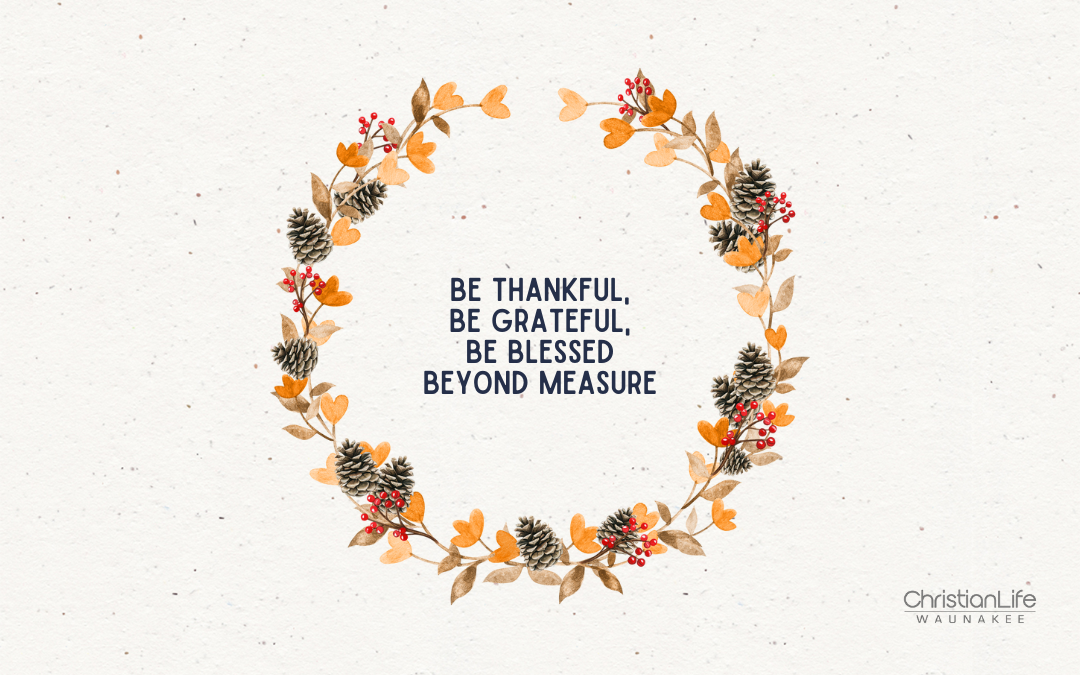We know that the Bible commands Christians to give thanks, but did you know that being grateful can also make you healthier? Research in psychology has consistently shown that gratitude is connected with mental, physical, and relational benefits. Here are five ways that gratitude can improve our lives.
A Better Relationship with God
According to an article by Harvard Health, being grateful “helps people connect to something larger than themselves.” This is certainly true for Christians, since being grateful reminds us that God is the source of all good things. When we feel distant from God, counting our blessings can help us remember all the ways He has been there for us in the past and in the present.
Better Relationships with People
1 Thessalonians 5:12-13 tells Christians to “encourage one another” and “acknowledge those who work hard amongst you” (NIV). Turns out (of course) that this is great advice for building good relationships within the church, at work, and at home. Psychological studies show that expressing gratitude helps individuals feel more positively toward each other and is a great motivating tool. According to Psychology Today, practicing gratitude can also increase empathy and help us be more patient with each other.
Improved Mental Health
Multiple studies have shown that gratitude can give us a stronger overall sense of well-being. Thankfulness is correlated with more positive feelings, happiness, optimism, and self-esteem. Philippians 4:6-7 backs this up: “Do not be anxious about anything, but in every situation, by prayer and petition, with thanksgiving, present your requests to God. And the peace of God, which transcends all understanding, will guard your hearts and your minds in Christ Jesus” (NIV). By focusing on the good instead of what’s making us anxious, we can replace anxiety with the peace of God.
Improved Physical Health
An article in Psychology Today states that people who practice gratitude tend to report better physical health. They also seem to be more likely to exercise and take other steps to care for their health compared to other people. The same article shares that people who spend 15 minutes writing grateful sentiments before bed sleep better and longer than people who don’t. It seems that since gratitude reduces stress and improves mental well-being, it can make us feel physically better and more motivated to take care of ourselves.
Resilience
Psychology Today points out that gratitude can not only reduce stress but also produce greater mental strength, or resilience. In psychology, resilience is the ability to mentally cope with challenges like change, uncertainty, and adversity. Practicing gratitude in small ways can help us live out the command in 1 Thessalonians 5:18 to “give thanks in all circumstances” (NIV).
Life moves fast, and it doesn’t always go the way we wanted or planned. We can sometimes forget to be grateful for what we have or focus on what we don’t have instead. As Thanksgiving approaches, this is the perfect time to intentionally start building habits of gratitude. Here are some ideas for practicing gratitude this holiday season:
- Mention at least one thing you’re thankful for in your daily prayer or meditation
- Keep a gratitude journal and write down some things you’re thankful for at the end of each day
- Set out a large piece of paper (or a pumpkin for a seasonal twist) and use markers to fill it up with little things you’re thankful to have in your life
- Write a thank you note to someone who doesn’t get much recognition for their hard work or kindness
- Tell your loved ones or friends why you’re thankful for them
- Make it a habit to thank God for little things throughout the day, such as meals, purchases, safe travel, etc.
How do you cultivate thankfulness? Let us know in the comments!
—————————————————

